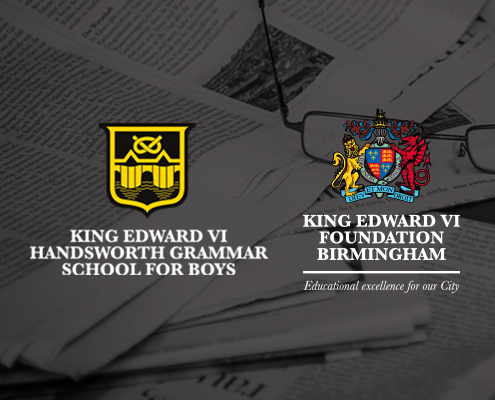From 23-26 October 2019, 25 HGS students (from Years 8-11), together with Mrs Hartt and Messrs Jones and Campbell, were on a Science and History trip to Berlin, Germany. There, we learnt about the history of Berlin during the Cold War and what life was like in East Germany under the Communist regime. We visited the Deutches Technikmuseum, Sachsenhausen concentration camp, which is not far north of Berlin, and the Olympiastadion.
We met up at Birmingham Airport and flew with FlyBe to Berlin Tegel Airport, where we boarded a coach before heading to our accommodation. There, we dropped our bags off and went to the Greek restaurant which was next to the hotel for a late dinner.
On the first day, we took the S-Bahn to Potsdamer Platz to begin a walking tour of Berlin. Potsdamer Platz was totally destroyed during WW2 with nothing left standing. It has had to be rebuilt and it is now full of very modern skyscrapers. In Potsdamer Platz there are still parts of the Berlin Wall left to look at and a cobblestone trail of where the wall used to be. From there, we crossed over to what was East Berlin. You could see the significant change from east to west, with buildings being split and how buildings on either side of the wall looked totally different. Then we saw where Adolf Hitler had committed suicide and been burned. This was at the site of his former underground bunker where he had controlled Germany during WW2. From there we went to the Brandenburg Gate, which was the main gate in and out of Berlin. Next, we saw the Reichstag, which was a beautiful building built in 1894 for the German Parliament. We then left our great tour guide and boarded a boat which took us along the River Spree. From the boat we could see the many different sites of Berlin, old and new, which were very interesting.
After that, we went to see the largest remaining section of the Berlin Wall (at Bernauer Strasse) and found out about the history of how the wall had separated communities and how many people had died trying to cross from east to west for a better life. After walking along the wall and seeing the church that had replaced a previous one which was burnt down by the Russians, we went to the DDR museum which showcased what life was like for East Germans under Communist rule. It showed us how difficult it was to live there with freedom of speech abolished and only one type of car available (The Trabant)! After that, we explored Alexanderplatz before going for our evening meal at the Route 66 restaurant and, finally, we enjoyed a session of bowling before returning to our hotel after a full and tiring day.
The next day we visited the Olympiastadion which was built for the 1936 Olympic games. We were told that it had retained its original outer ring of stone but had been transformed on the inside into a modern 74,475 capacity stadium which is used for athletic events and concerts but is also rented from the Berlin Council by Hertha Berlin FC. We toured the facilities including the changing rooms and the first-class lounges where the press conferences are held, and saw first-hand where Hitler had stood to open the 1936 Olympics.
Next, we visited Sachsenhausen Concentration Camp which is located in Oranienburg. It was opened in 1936 and used primarily for political prisoners, but in its later life was used for Jews, Poles and Jehovah’s Witnesses. In total, there were 200,000 inmates, of which 30,000 died. It was liberated in 1945 by The Polish Army’s 2nd Infantry Division. The visit there was very thought-provoking and our guide explained how the Third Reich brutally treated and murdered so many innocent men, women and children who had done nothing wrong apart from being born in the wrong place, to the wrong family or did not accept the ideals of the Nazi Party.
After that, we went to Berlin Science Museum (the Deutches Technikmuseum) and looked at the different scientific exhibits as well as the plane, train and automobile collections on show which were very interesting.
That night we ate at the accommodation before flying back the next day to Birmingham. Overall, it was a fun trip and it was very interesting to learn about the history of Germany as well as Berlin in particular.
Robert Callaghan, Year 10





Click here to view more photos in the gallery.




















